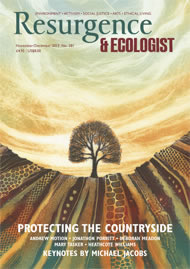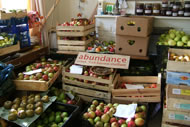In the UK, three projects are emerging that are setting great precedents for the development of new ecological food systems. At the core of these projects are human relationships rather than monetary transactions: they transcend the one-dimensional profit motive prevalent in industrial food systems, which in general do not consider the wellbeing of people and planet.
One example that could be replicated throughout the country is Abundance, a project run by Grow Sheffield, which each year mobilises Sheffield’s residents to harvest the city’s seasonal glut of fruit from over 300 trees – fruit that was previously left to rot. Now much of this fruit is being harvested and Sheffield residents have the opportunity to eat local, seasonal, ecologically produced food.
Within Abundance, the trade that occurs is non-monetary. Tree owners are given the first share of the fruit in exchange for access to their trees. Then harvesters and project volunteers are given fruit in exchange for their labour. Any remaining fruit is ‘gifted’ to Sheffield residents and community service organisations such as community cafés or refugee centres and through unusual celebratory events, where Sheffield residents are invited to exchange something – stories, ideas, recipes, music – for fruit.
Abundance is not concerned with commercial viability, but at least two other organisations are reconfiguring human relationships towards ecological food systems commercially. In the UK, the high cost of land is a prohibitive barrier to land-based ecological livelihoods. The Ecological Land Co-operative (ELC) is pioneering a new model to overcome this barrier. It has purchased agricultural land in Devon through community share offers and is in the process of selling 999-year leasehold agreements. With the land comes ELC’s support in the form of business advice and provision of on-site environmental services. Buyers pay not just with money but also with an assurance that they will care for the land and will not sell it for purposes other than ecological food production. These conditions, part of the legal sale documents, are intended to protect the grower from land price pressures, and ensure that the land cannot be sold on for development or a quick profit.
Another visionary project is Local Greens, a community-led organic vegetable box scheme in South London, which provides residents with 100% UK-produced food – no mean feat, especially since the UK experiences a yearly ‘hungry gap’ during late winter and early spring. Local Greens has an explicit policy of encouraging small local producers, and has developed planting plans with them to guarantee a steady income in exchange for a more-or-less reliable supply of organic or biodynamic produce throughout the year. Local Greens’ support has enabled the expansion of its producers’ businesses, and has empowered ‘amateur’ growers to sell their own produce that was previously eaten only by their family and friends.
These projects show us that monetary trade, while important, is not the driving factor in ecological food systems, because it is not possible to quantify all that is required to produce ecological food. They all depend on good human relationships, trust and generosity, but most of all on healthy and respectful relationships with the land itself. For most of us, our relationship with the land is often mediated through the relationships we have with those who produce our food. Ultimately we have to be able to trust that our food producers have care for the Earth at the heart of their businesses.








